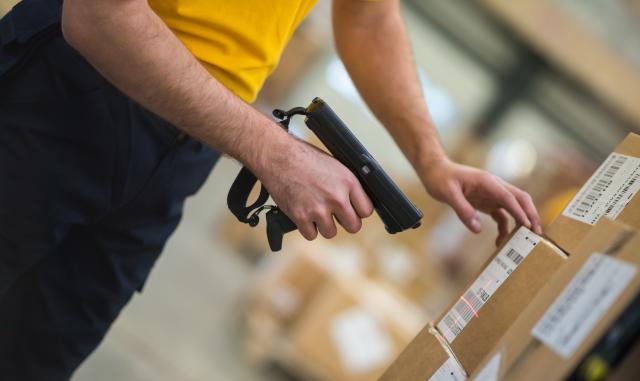Blockchain has an endless list of possible applications, and is quickly emerging as one of the major innovations in the digital technology industry. Supply chain management experts are already looking at practical applications for blockchain. Given that UK online sales alone are expected to grow by up to £77bn every year until 2021, they can see blockchain is poised to completely disrupt the logistics industry.In May 2017, Deloitte tweeted that 10% of global GDP would be built on top of blockchain applications. Andreas Freund, Ph.D., a senior manager for Tata Consultancy Services’ blockchain advisory, also predicts blockchain technology will be as revolutionary as the Internet, changing our marketplaces and our enterprises in ways that are hard to imagine right now. These ambitious claims are due to the innovative nature of blockchain and the potential it has to change the way we do business.
What is Blockchain?
Blockchain is a series of databases distributed through a network and acting as a tamper-proof, verifiable transaction record between multiple parties. It was initially developed as the accounting method for the virtual currency Bitcoin, but experts soon saw the potential of blockchain technology for many other applications. There are a growing number of companies testing blockchain to facilitate transactions and track assets using its distributed ledger technology.
With blockchain, every party in a transaction has a copy of the same record. No one can tamper with that record without everyone in the transaction knowing. There’s no need for a trusted third party to manage the transaction, since the rules and procedures for each transaction are built into the system. Each recorded step in the process is confirmed against preset rules and then encrypted, making the process highly secure and verified. Each member in the transaction must be validated and is only given access to predefined information.
 Source: Getty Images
Source: Getty Images
Blockchain in the Logistics Industry
The transportation and logistics industry quickly realised the benefits of blockchain to both decentralise and standardise the shipping industry. Experts from the technology and transportation industries formed the Blockchain in Transportation Alliance (BiTA) to develop blockchain standards specifically for the freight industry. As of December 2017, BiTA has over 100 member firms from within the logistics industry. UPS announced in December 2017 that they were joining the alliance.
FedEx, the parent company of TNT Express is also a member of BiTA. They have begun developing blockchain programs to improve transparency and data security. This comes after a high-profile cyber attack on its TNT Express branch in Europe last year. FedEx’s goal with blockchain is to provide visibility and security throughout the supply chain; before, during and after the parcel leaves their hands. They have already started a blockchain pilot program in their dispute resolution branch. They are using blockchain to link carriers upstream and downstream from their transactions. With blockchain they set standards for what data elements must be passed between each carrier, ensuring that specific information is included in every transaction. This means that each carrier in the chain is collecting and sharing the same information in order to resolve disputes at any stage within the delivery process.
A blockchain ledger can record and distribute data about each transaction within the supply chain process. Blockchain uses tokens to represent an item (or parcel), which makes sure that it never appears to be in two locations at once. Critical data like pricing, parcel contents (including any possible hazardous materials), handling requirements, expected ship date, delivery date, location, tracking status, custody, and any other data pertinent to the shipment is recorded and encrypted and passed between each supply chain partner. Because the data is tamper proof and validated, it serves as the single, trusted source of information for each transaction. Just a few other ways blockchain will transform the parcel industry include:
Streamline Transaction, Payment and Custody Transfer
The current process of supply chain management involves passing different hard copy and electronic documents between carriers. Each of these documents is different for each carrier, based on their own legal, financial and regulatory needs. With blockchain, the custody transfer is standardized and encrypted. Each person in the chain is validated, and his or her acceptance of the parcel is electronically recorded. There is no need to pass hard copies or wet signatures, or to rekey data from hard copy forms.
Integrate Parcel Delivery Standards
With so many different carriers, the industry lacks uniform compliance standards. This makes it difficult for new carriers to enter the market, as they need to integrate with the leading carriers’ differing systems in order to automate parcel rating, manifesting, and tracking. With eCommerce and just in time retail inventory management increasing the demand for new parcel delivery methods, a standard compliance technology would allow new delivery firms to enter the market, reducing shipping costs and increasing delivery options.
Improve Transparency and Chain of Custody
Both customers and retailers want the ability to track their parcels from point of origin to final delivery, but current delivery practices make real-time tracking almost impossible. Each carrier in the delivery process has its own system and standards for tracking parcels within its custody. Many only provide updates at specified locations. Blockchain provides real-time tracking capability throughout the shipment process, regardless of the carrier. Each authenticated user (including the retailer and customer) can view updated shipment status, including delays, and expected time of delivery.
Increase Security
Security is a major concern in the shipping industry, both physically and digitally. Blockchain allows package possession to be tracked at each step in the blockchain, safeguarding custody; from point of origin, to final delivery.
As customer expectations for convenience increase, delivery is one of the main ways suppliers can distinguish themselves. Blockchain has the capability to revolutionise the supply chain management process, setting the stage for major improvements in last mile delivery. By increasing transparency, coordination and security, blockchain lets delivery carriers provide a uniform, streamlined process that increases convenience and confidence for both the retailer and the customer.




